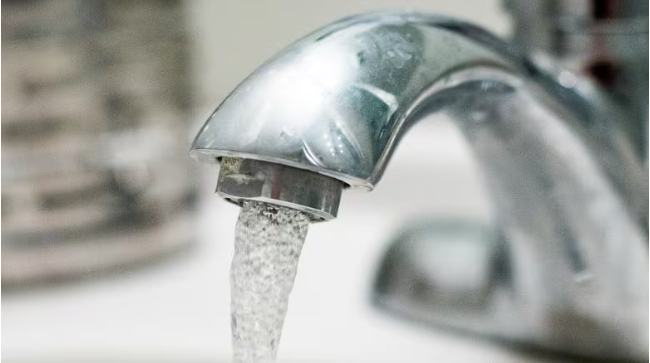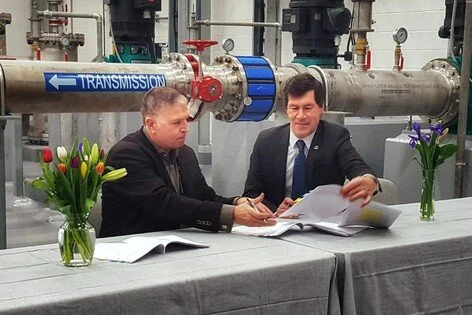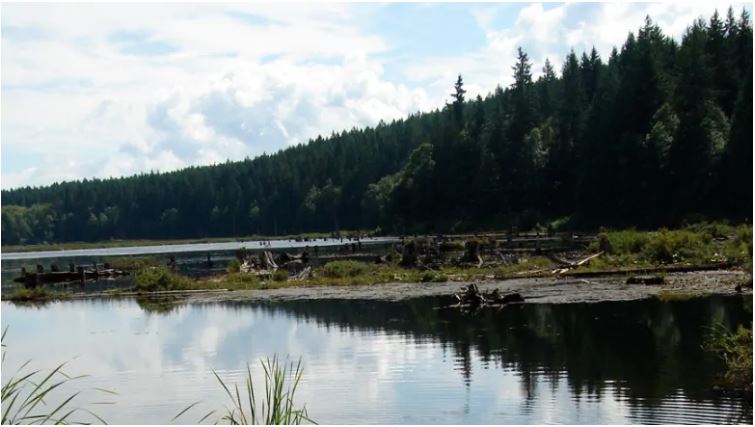Lynn Kriwoken dips a black rod into the deep waters of Alta Lake next to Whistler, B.C., about 157 kilometres north of Vancouver, and a bunch of different numbers start rapidly moving on her monitor. Depth, oxygen levels, turbidity and much more appear on the screen — metrics that measure the relative health of the water in the moment, and when done regularly enough, reflects the health of the lake over time.
Boil water advisory issued for Alma
A boil water advisory has been issued for the village of Alma, about 79 kilometres south of Moncton, because of high levels of turbidity in the reservoir. "These levels exceed the New Brunswick maximum acceptable concentrations," a notice issued by the local government on Wednesday morning says. Recent heavy rainfall caused the problem, according to chief administrative officer Hanna Downey — a drastic change from last weekend when the village almost ran out of water and had to urge residents to conserve as much as possible.
Here's the results of Delta's drinking water quality testing
City of Kimberley issues Water Quality Advisory
The City of Kimberley has issued their first Water Quality Advisory of the season on Wednesday, May 3, 2023. As is usual as the freshet builds up each spring, turbidity in local rivers and streams can cause water quality issues. Turbidity is a measurement of water clarity and can be an indicator of a potential health risk.
RDNO issues Grindrod water restrictions as turbidity increases
Watering your lawn is a big no-no in Grindrod right now. A temporary outdoor watering ban has been issued by the Regional District of North Okanagan. Spring runoff is causing a slow down at the Grindrod water treatment plant, resulting in restrictions on non-essential water use. Melting snow has caused water entering the plant to contain increased clay and silt particles.
Boil-water advisory lifted for South Slave communities
The advisory was first issued for the communities on May 12 as flooding in Hay River has affected operation of the town’s water treatment plan and resulted in higher than normal turbidity or muddy water. In a public notice on Tuesday, the territorial government announced residents in the four South Slave communities would no longer have to boil their drinking water as turbidity levels had dropped to acceptable levels in water from the water plant and other operational issues had been addressed.
Greater Vernon Water source switched
The Regional District of North Okanagan (RDNO) is alerting customers of Greater Vernon Water (GVW) that the Kalamalka Lake water source has been turned off effective today, Wednesday, May 11. The decision was based on increased turbidity due to rain and spring run-off in the Coldstream Creek watershed. Water will be supplied from the Duteau Creek Water Treatment Plant until turbidity decreases in Kalamalka Lake. Customers who are not normally on the Duteau Creek water source will notice the water is much softer and has a low alkalinity and pH. This may be of interest to those customers who have in-home water treatment systems or aquariums.
Délı̨nę, N.W.T., under boil water advisory
Délı̨nę is under a boil water advisory as a result of higher than normal turbidity, prompting the N.W.T.'s chief environmental officer to advise all residents to boil drinking water for at least one minute. In a news release Tuesday, the chief environmental health officer said the advisory is precautionary and is a result of muddy water. "There have been no illnesses associated with drinking water reported in the community," the release states.
Sachs Harbour boil water advisory has been lifted
The boil water advisory in Sachs Harbour, N.W.T., has been lifted, according to a Monday news release. The boil water advisory had been put into effect in early June due to higher than normal turbidity levels (muddy water). The levels have since dropped to "acceptable levels" in treated water from the water plant and "all issues" have been corrected. There have been no illnesses associated with drinking water reported in the community, the release says. The normal use of drinking water can resume.
Citizen scientists sought for Lake Erie testing
A group dedicated to protecting Canada’s freshwater is looking for citizen scientists to keep an eye on Lake Erie. The Canadian Freshwater Alliance is seeking 40 volunteers to become a Lake Erie Guardian who will test samples from the lake’s watershed. Testing will be done once a month from April to October with kits provided by Water Rangers, a non-profit group that records and analyzes water data. “Partnering with Water Rangers is new in terms of this initiative,” said Raj Gill, who oversees programs for the Great Lakes on behalf of the Alliance. “This is big growth for us.”
From bottled water to tap: Lhoosk’uz Dené Nation finds solution to water troubles
After two decades of relying on bottled water, members of a B.C. First Nation west of Quesnel will soon be able to drink water directly from the taps in their homes. An approximate $600,000 packaged water treatment system is anticipated to be installed at the Lhoosk’uz Dené Nation this fall. “This has been an important project that chief and council have been pushing for,” said band manager Brenda Thomas. “We’re all excited. For the past 20 years, we’ve never had potable water.”
Read the Cold Lake Sun Article
Bonnyville residents will be drinking Cold Lake water this week after a supply agreement was signed between the Cold Lake Regional Utility Services Commission and the Bonnyville Regional Water Commission on Jan.26. The agreement details the pricing, as well as the distribution framework, with Cold Lake RUSC being the supplier of the water to the BRWSC.
New technologies may help handle cloudy water from Great Slave Lake
The Town of Hay River is awaiting a GNWT report – expected at any moment – that might offer guidance on how the community’s water treatment plant could be upgraded to handle turbidity in Great Slave Lake. Turbidity – better known as muddiness – has resulted in three boil-water advisories since spring break-up, and the latest was still in effect as of late last week.
'Isn't this Canada?' Union Bay residents banned from public meeting
Union Bay resident Kathy Calder wants to know why she can't drink her tap water. Her community, in the Comox Valley on Vancouver Island, has been on a boil water advisory for more than a month. Calder was looking forward to asking some questions at Thursday night's Union Bay Improvement District [UBID] public meeting. However, a letter posted to the district's website Jan. 10 says residents are banned from attending the public meeting, which consists of elected officials.















